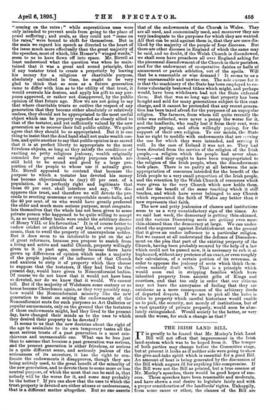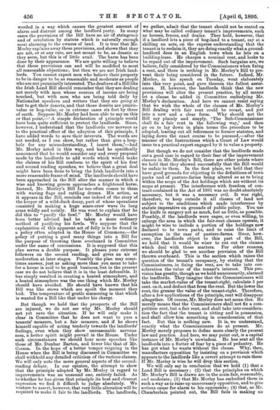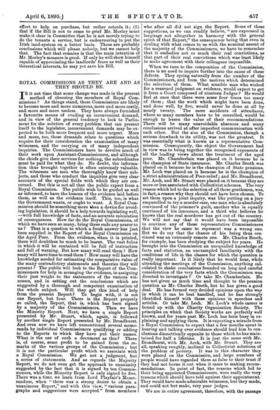THE IRISH LAND BILL.
IT is greatly to be feared that Mr. 3/Corley's Irish Land Bill will not effect that improvement in the Irish land-system which was to be hoped from it. The temper of both parties may change before the Committee stage, but at present it looks as if neither side were going to show the give-and-take spirit which is essential for a good Bill. An amount of heat is being generated by the discussion of the Bill which augurs ill for anything like compromise. If the Bill were not the Bill as printed, but a true essence of Mr. Morley's speeches, there would be good hopes of suc- cess. Those speeches have been reasonable and moderate, and have shown a real desire to legislate fairly and with a proper consideration of the landlords' rights. Unhappily, from some cause or other, the clauses of the Bill are worded in a way which causes the greatest amount of alarm and distrust among the landlord party. In many cases the provisions of the Bill have an air of stringency and of revolution by statute which is naturally enough most alarming to the owners of land. It is true that Mr. Morley explains away these provisions, and shows that they are not, or at any rate, are not meant to be, as drastic as they seem, but this is of little avail. The harm has been done by their appearance. We are quite willing to believe that these provisions can and will be modified to meet all reasonable objections ; but then we are not Irish land- lords. You cannot expect men who believe their property to be in danger to be as reasonable and moderate as people who are not pecuniarily interested. The drafters of a Bill like the Irish Land Bill should remember that they are dealing not merely with men whose sources of income are being touched, but with men who are being told daily by Nationalist speakers and writers that they are going at last to get their deserts, and that those deserts are prairie. value or bog-value, or in extreme cases six feet by three of earth. Suppose Mr. Morley had been able to say on this or that point,—' A simple declaration of principle would have been quite sufficient to protect the landlords. Since, however, 1 understand that the landlords are nervous as to the practical effect of the adoption of this principle, I have added words to save their interests. The words are not needed, as I can show, but rather than give a loop- hole for any misunderstanding, I insert them,'—had Mr. Morley acted in this way, and had he specifically announced that he would consider any and every proposal made by the landlords to add words which would make the clauses of his Bill conform to the spirit of his first and second reading speeches, we believe that a great deal might have been done to bring the Irish landlords into a more reasonable frame of mind. The landlords should have been approached in the Bill after the manner in which a wise and knowing groom approaches a frightened horse. Instead, Mr. Morley's Bill far too often comes to them with waving flags and rattling drums. His action, as it appears in the Bill, reminds one indeed of the story of the keeper of a wild-duck decoy, part of whose operations consisted in making a huge scare-crow wave its long arms wildly and noisily. He was wont to explain that he did this to "pacify the fowl." Mr. Morley would have been better advised had he taken a more ordinary method of pacifying his fowls. We suppose that the explanation of this apparent act of folly is to be found in a policy often adopted in the House of Commons,—the policy of putting a good many things into a Bill for the purpose of throwing them overboard in Committee under the name of concessions. It is supposed that this plan serves a double purpose. It pleases your extreme followers on the second reading, and gives an air of moderation at later stages. Possibly the plan may some- times answer, just as asking more than you mean to take for a house is said to be good business, but in the present case we do not believe that it is in the least defensible. It has simply resulted in creating a heated atmosphere, and a heated atmosphere was the one thing which Mr. Morley should have avoided. He should have known that his Bill was like stews which are spoilt the moment they boil. The temperature of gentle simmering is that which is wanted for a Bill like that under his charge.
But though we hold that the prospects of the Bill are injured, we do not see why Mr. Morley should not yet save the situation. If he will only make it clear in Committee that he does not want to pass a tenants' measure, but a fair measure, and if he shows himself capable of acting tenderly towards the landlords' feelings, even when they show unreasonable nervous- ness, a better spirit might prevail in the House. Under such circumstances we should hear more speeches like those of Mr. Dunbar Barton, and fewer like that of Mr. Carson. In the hope of a better temper reigning in the House when the Bill is being discussed in Committee we shall withhold any detailed criticism of the various clauses. We will only note the more general aspects of the second- reading debate. In our opinion, the attempt to show that the principle adopted by Mr. Morley in regard to improvements was an unsound one, entirely failed. As to whether he has given that principle its best and clearest expression we find it difficult to judge absolutely. We venture to assert, however, that very little alteration will be required to make it fair to the landlords. The landlords, we gather, admit that the tenant should not be rented on what may be called ordinary tenant's improvements, such as houses, fences, and drains. They hold, however, that if a landlord lets a piece of bog-land to a tenant, say at a shilling an acre, on the express understanding that the tenant is to reclaim it, they are doing exactly what a ground- landlord does in an English town when he lets on a building-lease. He charges a nominal rent, and looks to be repaid out of the improvement. Such bargains are, we believe, fully considered by the Commissioners when fixing a rent, and there is nothing in Mr. Morley's Bill to pre- vent their being considered in the future. Indeed, Mr. Morley, in his speech on Tuesday, went elaborately into this very point, and gave thereon the fullest assur- ances. If, however, the landlords think that the new provisions will alter the present practice, by all means let a clause be added in Committee embodying Mr. Morley's declaration. And here we cannot resist saying that we wish the whole of the clauses of Mr. Morley's Bill dealing with fair rent could be recast, and put into a new and a clear form. Why should not the Bill say plainly and simply, The Sub-Commissioner shall fix a fair rent in the following way,' and then go on to lay down in plain terms the procedure to be adopted, leaving out all references to former statutes, and laying down the exact course to be pursued,—after the manner of the Instructions which a. Court of Law would issue to a practical expert engaged by it to value a property.
But though we do not consider that the landlords made out a good case in regard to their fear of the improvement clauses in Mr. Morley's Bill, there are other points where we hold that they showed successfully that the Bill would be unfair to them. In the first place, we hold that they have good grounds for objecting to the definitions of town parks and of pasture-farms being altered so as to bring within the scope of the Act holdings which are without its scope at present. The interference with freedom of con- tract contained in the Act of 1881 was no doubt absolutely necessary, but it was a necessary evil. It was right, therefore, to keep outside it all classes of land not subject to the conditions which made interference by statute imperative on grounds of public policy. You use the knife in surgery not as much, but as little, as possible. Possibly, if the landlords were eager, or even willing, to enlarge the area in which the fair-rent clauses operate, it might be wise to include a portion of the holdings now declared to be town parks, and to raise the limit of exemption in the case of pasture-farms. Since, how- ever, the landlords object to this part of the Bill, we hold that it would be wiser to cut out the clauses which deal with these matters. For other reasons, we should be glad to see another provision of the Bill thrown overboard. This is the section which raises the question of the tenant's occupancy, by stating that the Commissioners, in fixing the rent, are to take into con- sideration the value of the tenant's interest. This pro- vision has greatly, though as we hold unnecessarily, alarmed the landlords. They imagine that the Commissioners will take the market-value of the tenant-right, calculate 5 per cent. on it, and deduct that from the rent. But the lower the rent, the greater the value of the tenant-right. Therefore, after a few applications of the principle, rent will disappear altogether. Of course, Mr. Morley does not mean this. He merely means that the Commissioners shall not fix a com- petition rent, but a fair rent, and shall take into considera- tion the fact that the tenant is sitting and in possession, and shall allow him something in consideration of that fact. But this is nothing new. It is, we understand, exactly what the Commissioners do at present. Mr. Morley merely proposes to define more clearly the present law and practice. And here, we may point out, is a capital instance of Mr. Morley's unwisdom. He has sent all the landlords into a flutter of fear by a piece of pedantry. He has got what he wants without the clause. Why, then, manufacture opposition by insisting on a provision which appears to the landlords like a covert attempt to ruin them If Mr. Morley is wise he will drop this section. We will only say in conclusion that we hold (1) that a Land Bill is necessary ; (2) that the principles on which Mr. Morley's Bill is drawn are in the main fair, reasonable, and moderate ; (3) that Mr. Morley has embodied them in such a way as to raise up unnecessary opposition, and to give serious cause for alarm to his opponents ; (4) that, as Mr. Chamberlain pointed out, the Bill fails in making no effort to help on purchase, but rather retards it ; (5) that if the Bill is not to come to grief Mr. Morley must make it clear in Committee that he is not merely trying to do the tenants a service, but is endeavouring to put the Irish land-system on a better basis. These are probably conclusions which will please nobody, but we cannot help that. The fact that remains is that the main intention of Mr. Morley's measure is good. If only he will show himself capable of appreciating the landlords' fears as well as their theoretical interests, he may yet save his Bill.








































 Previous page
Previous page